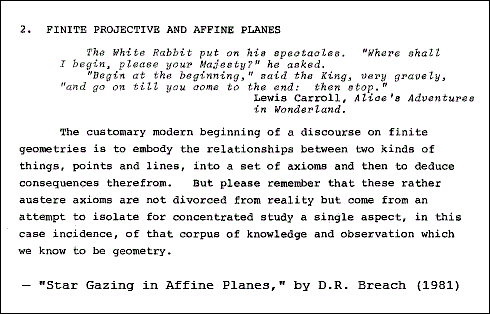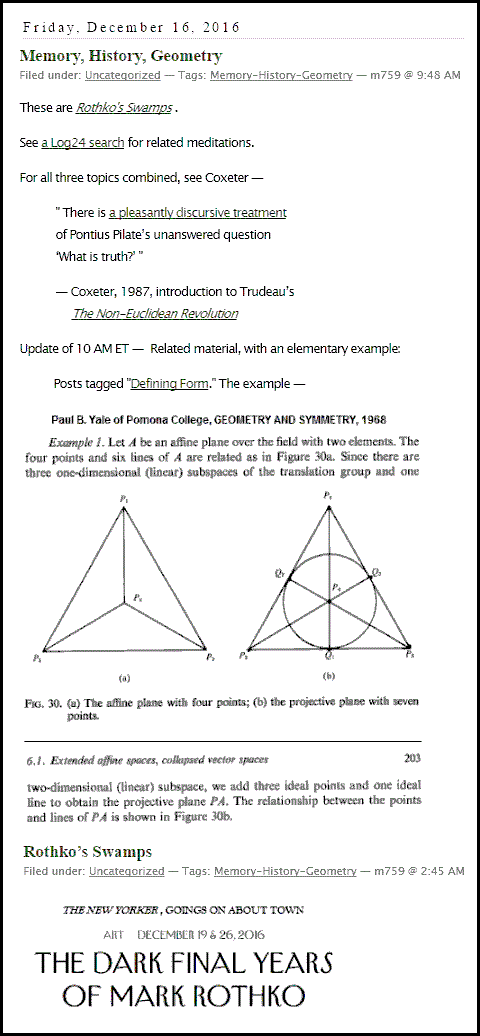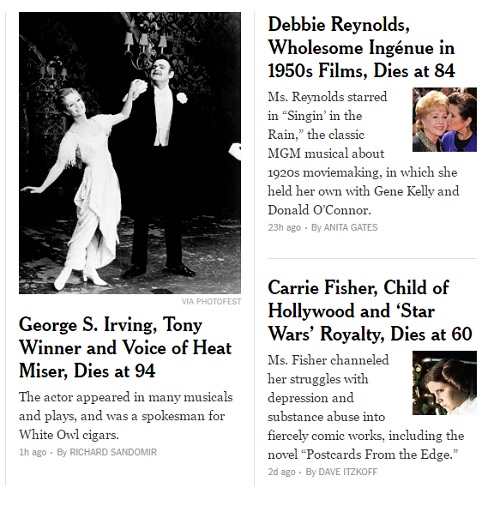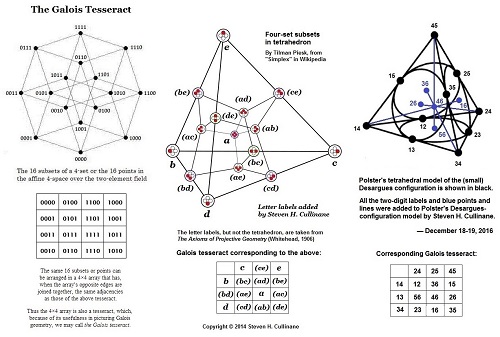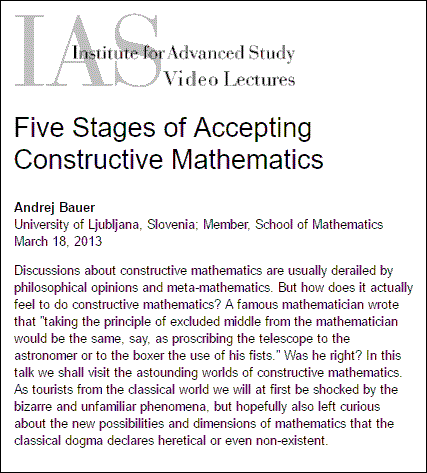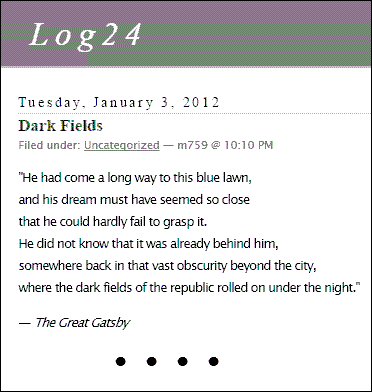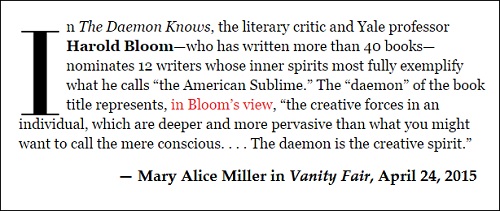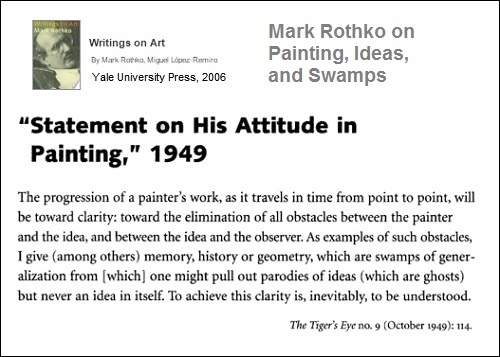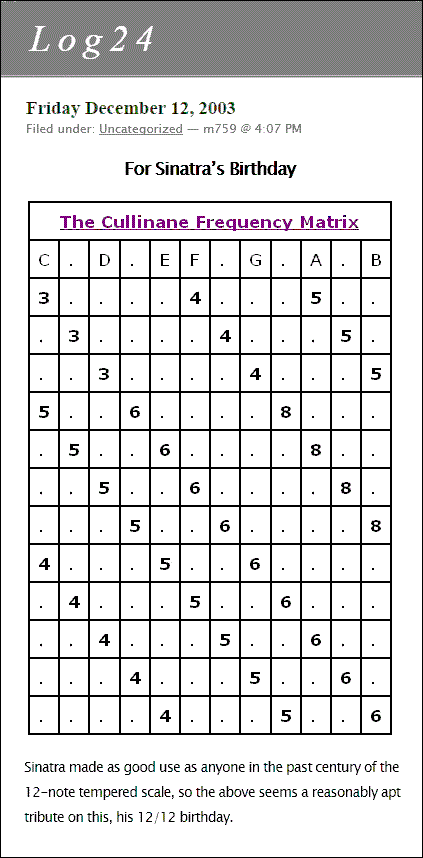Breach's 1981 approach is not axiomatic,
but instead graphic. Another such approach —
Saturday, December 31, 2016
Habeas
Toronto Star Quality
Rogue One’s Opening Date
Friday, December 30, 2016
ZZZ Accounting
Or: Lost in Conversion
The main title is the name of Ben Affleck's firm in "The Accountant."
The subtitle was suggested by religious remarks in the previous post.
From "The Man Who Tried to Redeem the World with Logic" —
"The following June, 1945, von Neumann penned
what would become a historic document entitled
'First Draft of a Report on the EDVAC,' the first published
description of a stored-program binary computing machine—
the modern computer."
Image from von Neumann's report —

Version converted to text —

See also "Turing + Dyson" in this journal . . .
For a character that "spans both worlds,"
see posts tagged "Oscar Day 2007."
Related image data —
" 'No views' is good." — Christian Wolff
For the Accountant*
From "The Man Who Tried to Redeem the World with Logic" —
"To store the programs as data, the computer would need
something new: a memory. That’s where Pitts’ loops
came into play. 'An element which stimulates itself
will hold a stimulus indefinitely,' von Neumann wrote
in his report . . . ."
— Amanda Gefter, Nautilus , Feb. 5, 2015
Related material —
"Here we go loop de loop" — Johnny Thunder, 1962
* I.e., Ben Affleck in his new film.
Thursday, December 29, 2016
Wednesday, December 28, 2016
Meanwhile…
Rosetta Tesseracts
Tuesday, December 27, 2016
The Dark Side
"The record, released on the Diamond label,
became a big hit, rising to no. 4 on the
Billboard Hot 100 in early 1963." — Wikipedia
Bright Star
See instances of the title in this journal.
Material related to yesterday evening's post
"Bright and Dark at Christmas" —
The Buddha of Rochester:
See also the Gelman (i.e., Gell-Mann) Prize
in the film "Dark Matter" and the word "Eightfold"
in this journal.
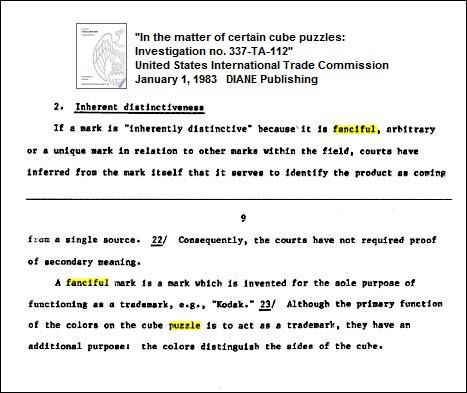
" A fanciful mark is a mark which is invented
for the sole purpose of functioning as a trademark,
e.g., 'Kodak.' "
"… don't take my Kodachrome away." — Paul Simon
Monday, December 26, 2016
Bright and Dark at Christmas
See also this journal on Christmas night.
"Adam Frank, an astrophysicist who writes for NPR's
13.7 blog, described dark matter by comparing it to
a ghost in a horror movie. You can't see it, he writes —
'but you know it's with you because it messes with
the things you can see. ' " — NPR.org this evening
See as well today's post Old News and the Nov. 4, 2008,
book on Charles Dickens, The Man Who Invented Christmas .
For What It’s Worth
The previous post introduced the phrase "secondary meaning."
A discussion —
" In order to establish a secondary meaning for a term,
a plaintiff 'must show that the primary significance in
the minds of the consuming public is not the product
but the producer.' "
— FreeAdvice®.com
See also The Zero Theorem and Bialystock in this journal.
Fanciful (continued)
From "Plato Thanks the Academy," March 19, 2014 —
“Click on fanciful .”
A possible result —

See also "Triple Cross."
Old News
From IndieWire on November 11, 2016 —
"Bleecker Street has announced it has acquired
U.S. and select territory rights to 'The Man Who
Invented Christmas,' to be directed by Bharat
Nalluri. The film will start shooting next month
and is targeting a holiday 2017 release date."
This journal on November 11, 2016 —
On Christmas 2015, Log24 featured
the Bleecker Street favicon
![]()
in the post 'Dark Symbol.'
Here is the dark symbol again —
The apparent symbols for "times" and "plus"
in the above screenshot are, of course, icons for
browser functions. Readers who prefer the
fanciful may regard them instead as symbols for
"a gateway to another realm," that of number theory.
Last December 26
|
Saturday, December 26, 2015
Midnight Reflection
|
This year on December 26 — A Lutheran-related note from 2015 …
… and one from Christmas 2016 —
Sunday, December 25, 2016
Last Christmas*
From "Bright Symbol," a post of 12 AM
on December 25, 2015 —
From "Dark Symbol," a post of 12 PM
on December 25, 2015 —
* Title suggested by a song released by Epic Records in 1984.
Credit Where Due
Saturday, December 24, 2016
Early X Piece
In memory of an American artist whose work resembles that of
the Soviet constructivist Karl Ioganson (c. 1890-1929).
The American artist reportedly died on Thursday, Dec. 22, 2016.
|
"In fact, the (re-)discovery of this novel structural principle was made in 1948-49 by a young American artist whom Koleichuk also mentions, Kenneth Snelson. In the summer of 1948, Snelson had gone to study with Joseph Albers who was then teaching at Black Mountain College. . . . One of the first works he made upon his return home was Early X Piece which he dates to December 1948 . . . . "
— "In the Laboratory of Constructivism: |
The word "constructivism" also refers to a philosophy of mathematics.
See a Log24 post, "Constructivist Witness," of 1 AM ET on the above
date of death.
Friday, December 23, 2016
Memory, History, Geometry
Code Blue

Update of 7:04 PM ET —
The source of the 404 message in the browsing history above
was the footnote below:
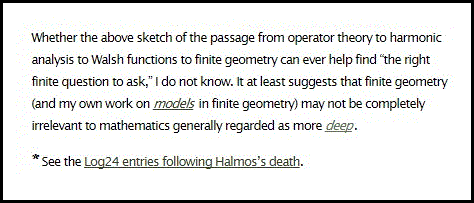
Requiem for a Mathematician
From a Dec. 21 obituary posted by the
University of Tennessee at Knoxville —
"Wade was ordained as a pastor and served
at Oakwood Baptist Church in Knoxville."
Other information —

In a Log24 post, "Seeing the Finite Structure,"
of August 16, 2008, Wade appeared as a co-author
of the Walsh series book mentioned above —

Walsh Series: An Introduction
to Dyadic Harmonic Analysis,
by F. Schipp et al.,
Taylor & Francis, 1990
From the 2008 post —
The patterns on the faces of the cube on the cover
of Walsh Series above illustrate both the
Walsh functions of order 3 and the same structure
in a different guise, subspaces of the affine 3-space
over the binary field. For a note on the relationship
of Walsh functions to finite geometry, see
Symmetry of Walsh Functions.
Nightmares Before Christmas
Recent posts have featured the Tim Burton films
"Miss Peregrine's Home for Peculiar Children"
(and the Ghost Ship), as well as "Ed Wood" (and Plan 9).
Related material —
Thursday, December 22, 2016
The Meadow in December
… "icy white and crystalline" — Johnny Mercer
From a search in this journal for Hudson Hawk —

See also Stella Octangula.
Funny Peculiar, Not Funny Ha-Ha
The Laugh-Hospital
See also, from the above publication date, Hudson's Inscape.
The inscape is illustrated in posts now tagged Laughing Academy.
Constructivist Witness
The title refers to a philosophy of mathematics.
For those who prefer metaphor… Folk Etymology.
See also Stages of Math at Princeton's
Institute for Advanced Study in March 2013 —
— and in this journal starting in August 2014.
Wednesday, December 21, 2016
Space Itself
Consider Stevens’s verse from “The Rock” (1954):
“That in which space itself is contained.”
Consider also Whitehead in 1906 —
"This is proved by the consideration
of a three dimensional geometry in which
there are only fifteen points."
— and Stevens on the sublime (1935):
"And the sublime comes down
To the spirit itself,
The spirit and space,
The empty spirit
In vacant space."
Tuesday, December 20, 2016
Enumerating Entities

See also a Terry Gilliam film on "crunching entities."
The Empire Strikes Back
Order of the British Empire
in news photo from 1994

This OBE was in the news again today.
Its recipient reportedly died yesterday.
The Project’s Central Problem
From page 180, Logicomix —

Alfred North Whitehead in the first of
the above-named years, 1906 —

"But the project's central problem was always there."

"The deeper we got into our Quest…
…The more I doubted its premises."
— Attributed to Bertrand Russell
by Apostolos Doxiadis and Christos
Papadimitriou in Logicomix (2008-9)
Monday, December 19, 2016
Requiem for a Pollster
Tetrahedral Cayley-Salmon Model
The figure below is one approach to the exercise
posted here on December 10, 2016.

Some background from earlier posts —
Click the image below to enlarge it.
Sunday, December 18, 2016
Manifest O
Sunday Dinner Crumbs
From posts now tagged “Memory-History-Geometry” —
“… even the dogs under the table
eat the children’s crumbs.” — Mark 7:28
From a 2015 post …
“… Kansas and Harvard officially met
as Kansas wrestled the unsuspecting Harvard
to the ground in a headlock.”
— Harvard Heart of Gold , by Dustin Aguilar,
quoted here on April 24, 2015
For the dogs under the table, a note from that same date —
See as well Tom Wolfe on manifestos
and “the creative spirit.”
Two Models of the Small Desargues Configuration
Saturday, December 17, 2016
Tetrahedral Death Star
Continuing the "Memory, History, Geometry" theme
from yesterday …
See Tetrahedral, Oblivion, and Tetrahedral Oblivion.
"Welcome home, Jack."
Browder Obit
Update, later the same day —
The sons of Earl Browder enjoyed greater academic success later
in the twentieth century:
The Exercist
See Exercise in this journal.
Happy birthday to Pope Francis.
Friday, December 16, 2016
Memory, History, Geometry
These are Rothko's Swamps .
See a Log24 search for related meditations.
For all three topics combined, see Coxeter —
" There is a pleasantly discursive treatment
of Pontius Pilate’s unanswered question
‘What is truth?’ "
— Coxeter, 1987, introduction to Trudeau’s
The Non-Euclidean Revolution
Update of 10 AM ET — Related material, with an elementary example:
Posts tagged "Defining Form." The example —
Rothko’s Swamps
“… you don’t write off an aging loved one
just because he or she becomes cranky.”
— Peter Schjeldahl on Rothko in The New Yorker ,
issue dated December 19 & 26, 2016, page 27
He was cranky in his forties too —
See Rothko + Swamp in this journal.
Related attitude —
From Subway Art for Times Square Church , Nov. 7
Thursday, December 15, 2016
Wednesday, December 14, 2016
Outer Sanctum
From this journal on Dec. 12, the date of the bishop's death —
"Ordinary life and daily work are paths to sanctity . . . ."
Close enough.
Graveyard Roses
Two deaths on Tuesday, Dec. 13, 2016 —
In memory of game show figure Alan Thicke —
In memory of game theory author Thomas Schelling —
Barbara Rose in a Log24 search for Princeton + Art.
Tuesday, December 13, 2016
The Thirteenth Novel
John Updike on Don DeLillo's thirteenth novel, Cosmopolis —
" DeLillo’s post-Christian search for 'an order at some deep level'
has brought him to global computerization:
'the zero-oneness of the world, the digital imperative . . . . ' "
— The New Yorker , issue dated March 31, 2003
On that date ….
Related remark —
" There is a pleasantly discursive treatment
of Pontius Pilate’s unanswered question
‘What is truth?’ "
— Coxeter, 1987, introduction to Trudeau’s
The Non-Euclidean Revolution
Yellow Ribbon Review
Monday, December 12, 2016
Tie a Yellow Ribbon ’Round the Old Crime Scene
"It's been three long years" — Tony Orlando
The above link leads to Log24 posts that mention
the late British author Colin Wilson, whose obituary
appeared in The New York Times on this date in 2013.
A date which would perhaps be considered more relevant
by Wilson himself is that of his death, Dec. 5, 2013.
See this journal on that date.
Symbology for Dan Brown and Stephen King
She Sings at the Finale
The title is from a post of last Thursday afternoon — Dec. 8, 2016.
An image from that post appeared here last year —
See also philosophy notes from Infinite Jest .
Some backstory —
Sunday, December 11, 2016
Bad Dreams
"… were it not that I have bad dreams" — Hamlet
See references in this journal to
"Nightmare Alley" and "Damnation Morning."
Expanding the Spielraum
Tony Stark's "little gray area" remark to Peter Parker
in the previous post suggests an elementary calculation:

Compare to a remark from Wikipedia:

"This is the total area of
the 88 modern constellations
in the sky."
— Wikipedia, Square degree
Stark to Parker in New Trailer
"Don't do anything I would do.
And definitely don't do anything I wouldn't do.
There's a little gray area in there
and that's where you operate."
See as well "Spirit and Space" (Nov. 25, 2016) —
Complexity to Simplicity via Hudson and Rosenhain*
*The Hudson of the title is the author of Kummer's Quartic Surface (1905).
The Rosenhain of the title is the author for whom Hudson's 4×4 diagrams
of "Rosenhain tetrads" are named. For the "complexity to simplicity" of
the title, see Roger Fry in the previous post.
Complexity to Simplicity
Cézanne "showed how it was possible to pass
from the complexity of the appearance of things
to the geometrical simplicity which design demands."
— Roger Fry in the catalogue for the 1910 London
exhibition "Manet and the Post-Impressionists,"
according to …
See also A Roger Fry Reader
(edited by Christopher Reed,
University of Chicago Press, 1996).
Saturday, December 10, 2016
Folk Etymology
Images from Burkard Polster's Geometrical Picture Book —

See as well in this journal the large Desargues configuration, with
15 points and 20 lines instead of 10 points and 10 lines as above.
Exercise: Can the large Desargues configuration be formed
by adding 5 points and 10 lines to the above Polster model
of the small configuration in such a way as to preserve
the small-configuration model's striking symmetry?
(Note: The related figure below from May 21, 2014, is not
necessarily very helpful. Try the Wolfram Demonstrations
model, which requires a free player download.)
Labeling the Tetrahedral Model (Click to enlarge) —
Related folk etymology (see point a above) —
Related literature —
The concept of "fire in the center" at The New Yorker ,
issue dated December 12, 2016, on pages 38-39 in the
poem by Marsha de la O titled "A Natural History of Light."
Cézanne's Greetings.
Friday, December 9, 2016
Optimism
Snow Dance
See Ballet Blanc in this journal.
For a darker perspective, click on the image below.
See also Cartier in The Hexagon of Opposition.
Happy birthday to Kirk Douglas.
Thursday, December 8, 2016
Space News

"Bad news on the doorstep…." — American Pie
Update of 5:24 PM ET — A requiem chord —
|
Tom Stoppard, Jumpers —
“Heaven, how can I believe in Heaven?” “Just a lying rhyme for seven!” |
Perhaps.
Finite Groups and Their Geometric Representations
The title is that of a presentation by Arnold Emch
at the 1928 International Congress of Mathematicians:
See also yesterday's "Emch as a Forerunner of S(5, 8, 24)."
Related material: Diamond Theory in 1937.
Further remarks: Christmas 2013 and the fact that
759 × 322,560 = the order of the large Mathieu group M24 .

Wednesday, December 7, 2016
Spreads and Conwell’s Heptads
For a concise historical summary of the interplay between
the geometry of an 8-set and that of a 16-set that is
involved in the the Miracle Octad Generator approach
to the large Mathieu group M24, see Section 2 of …
Alan R. Prince
A near projective plane of order 6 (pp. 97-105)
Innovations in Incidence Geometry
Volume 13 (Spring/Fall 2013).
This interplay, notably discussed by Conwell and
by Edge, involves spreads and Conwell’s heptads .
Update, morning of the following day (7:07 ET) — related material:

See also “56 spreads” in this journal.
Emch as a Forerunner of S(5, 8, 24)

Commentary —
|
"The close relationships between group theory and structural combinatorics go back well over a century. Given a combinatorial object, it is natural to consider its automorphism group. Conversely, given a group, there may be a nice object upon which it acts. If the group is given as a group of permutations of some set, it is natural to try to regard the elements of that set as the points of some structure which can be at least partially visualized. For example, in 1861 Mathieu… discovered five multiply transitive permutation groups. These were constructed as groups of permutations of 11, 12, 22, 23 or 24 points, by means of detailed calculations. In a little-known 1931 paper of Carmichael [5], they were first observed to be automorphism groups of exquisite finite geometries. This fact was rediscovered soon afterwards by Witt [11], who provided direct constructions for the groups and then the geometries. It is now more customary to construct first the designs, and then the groups…."
5. R. D. Carmichael, Tactical configurations of rank two,
11. E. Witt, Die 5-fach transitiven Gruppen von Mathieu,
— William M. Kantor, book review (pdf), |
Tuesday, December 6, 2016
Welcome to the Jungle Book
"It was only the genius of Ramanujan
that could transmute the handicaps
of colonialism into a triumph."
— See more at:
http://www.3quarksdaily.com/3quarksdaily/2011/01/
the-use-and-misuse-of-srinivasa-ramanujan.html
Related material:
‘Major League’ Meets Joe Black
Monday, December 5, 2016
Season’s Greetings from CBS
Sunday, December 4, 2016
London Recessional
Sunday Sermon
Saturday, December 3, 2016
Harry Potter and the Lumber Room
"The dramatic irony is tragically strong with this one."
— A line from …
|
‘Harry Potter’: Who Is BY KAYTI BURT AUGUST 1, 2016 |
Harry Potter with the lightning-bolt scar:

See also "Lumber Room" in this journal.
SIAM Publication
For "the Trojan family" —
Related material on the late Solomon W. Golomb —
"While at JPL, Sol had also been teaching some classes
at the nearby universities: Caltech, USC and UCLA. In
the fall of 1962, following some changes at JPL—and
perhaps because he wanted to spend more time with
his young children— he decided to become a full-time
professor. He got offers from all three schools. He
wanted to go somewhere where he could 'make
a difference'. He was told that at Caltech 'no one has
any influence if they don’t at least have a Nobel Prize',
while at UCLA 'the UC bureaucracy is such that no one
ever has any ability to affect anything'. The result was
that—despite its much-inferior reputation at the time—
Sol chose USC. He went there in the spring of 1963 as
a Professor of Electrical Engineering—and ended up
staying for 53 years." — Stephen Wolfram, 5/25/16
See also Priority (Nov. 25) and "What's in a Name" (Dec. 1).
Friday, December 2, 2016
Smoke from the Sacred Wood
The beginning of an essay by Emily Witt that is to appear on Sunday,
Dec. 4, 2016, in the T Magazine of The New York Times —
| "Palo santo, which means 'holy stick' in Spanish, is a tree indigenous to the Caribbean and South America. When burned, it emits a fragrance of pine and citrus. Lighting a stick of palo santo, like burning a bundle of sage or sweetgrass, is believed to chase away misfortune. Amazonian shamans use it in ayahuasca ceremonies to cleanse a ceremonial space of bad spirits. Given its mystical connotations, it’s not a scent associated with the secular world, but lately I have noticed its distinctive smoke wafting over more earthly settings, from Brooklyn dive bars to blue-chip art openings." |
The ending of an essay by T. S. Eliot that appeared in his 1921 book
titled The Sacred Wood —

Those who prefer ayahuasca ceremonies may consult
a Sept. 10 post, Cocktail of the Damned.
A Small Witt Design*
The New York Times 's online T Magazine yesterday —
"A version of this article appears in print on December 4, 2016, on page
M263 of T Magazine with the headline: The Year of Magical Thinking."
* Thanks to Emily Witt for inadvertently publicizing the
Miracle Octad Generator of R. T. Curtis, which
summarizes the 759 octads found in the large Witt design.
Images from a Lumber Room*
An image search today for
"Design Cube" + Cullinane:
Click to enlarge (5.3 MB) —

* For the title, see St. Andrew's Day.
Thursday, December 1, 2016
Correlation/Correlative
http://m759.net/wordpress/?s="Correlation"
http://m759.net/wordpress/?tag=correlative
Related literary reference —
"The only way of expressing emotion in the form of art
is by finding an 'objective correlative'; in other words,
a set of objects, a situation, a chain of events which
shall be the formula of that particular emotion; such that
when the external facts, which must terminate in sensory
experience, are given, the emotion is immediately evoked.
If you examine any of Shakespeare’s more successful
tragedies, you will find this exact equivalence…."
— T. S. Eliot, "Hamlet and His Problems" (1919)
